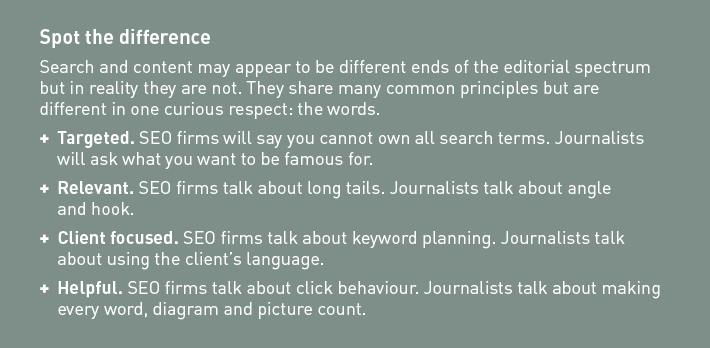B2B marketers, armed with limited budgets and facing a choice between spending the bulk of it on content creation or SEO, are entitled to be a little confused. Using SEO to complement the editorial will maximise ROI.
“What time is the Super Bowl?” is a simple question often asked. American Football’s showpiece final changes venue each year and because the United States is so vast the time zone often changes as well. The result: people are never quite sure what time the game kicks off. Hence the regularity of the question each January.
Back in 2011, a Huffington Post journalist – curious and with ready access to Google Trends – noticed the spike. So he wrote a story, using the question as the title and providing the pertinent facts. Top spot on Google’s search results page, tons of traffic and lots of copycat articles followed.
The tale of the Super Bowl is often held up as evidence of the primacy of search optimisation. In truth, it tells us something more nuanced and more interesting. It tells us that search and content have a symbiotic relationship and without the creativity and wit of the content creator – aka the journalist – search is redundant. It’s about execution. It’s about application. It’s about editorial smarts. It’s about the content, stupid.
B2B firms, armed with limited budgets and facing a choice between spending the bulk of it on content creation or search optimisation, are entitled to be a little confused. Confused especially as most agencies they encounter tell them they know SEO and that a little bit of SEO black magic will make all the difference.
The lesson here is not that you should avoid optimising for search but that you should do so in order to complement the editorial.
The core principles
There are core principles that should be applied. Among them is the requirement that the content team metaphorically puts itself in front of your client’s keyboard to understand what words and phrases he or she would use to find the information sought. It means acknowledging that people user proper nouns – people, places, products and services – and industry-specific terminology – regulations, specifications and so on – when composing search queries. It means being client-facing.
Crucially, the dark arts days of search are over. It's old news that keyword stuffing, shady link-building tactics and the other "black hat" techniques do more harm to your site than good. Search engines are constantly refining their algorithms to surface destination articles that match the query. In short, they reward relevance. That means high quality content trumps optimised pages of mediocre quality.
Does optimisation matter? Of course it does but a smart content marketing agency will bake it into the process. Search disciplines will underpin the architecture of website build so content can be found and indexed by search engines, and that it is mobile friendly. Search disciplines are central to editorial workflow, too. The use of tools like AdWords and Google Trends ensures that the wording and phrasing employed reflects queries being searched – passing the “What time is the Super Bowl?” test, in other words.

The content/search equation
There are other factors to take into account for those weighing up the content / search equation. The first is that search is not the only game in town. Social matters too. Social media is just as powerful for delivering referral traffic, if not more. Search still matters but social matters too – and on social networks all those things that don’t necessarily play well on Google (word play, humour and so on) work wonderfully.
Second, B2B thought leadership is not about absolute numbers. It’s not simply about reach – it’s about being seen by a small but perfectly formed audience. Moreover, it’s not just about factual information that can form a relatively simple search query. It’s about a demonstration of expertise, understanding, insight and innovative thinking. It’s about convincing those clients through the power and persuasion of the words on the page that your organisation has the proficiency and experience they are looking for. To this end, a newsletter or a personal email might be as good a means of dissemination as search or social.
To ignore the principles of search is a dereliction of duty but to start with search is to misunderstand the purpose and value of content marketing – namely to provide value, intelligence and thought leadership. To do otherwise is to let the tail wag the dog. “What time is the Super Bowl?” is perhaps the exception that proves the rule. More likely it is evidence of editorial creativity and quick thinking. Remember: while search is part of the equation, content is the sum of the parts.


